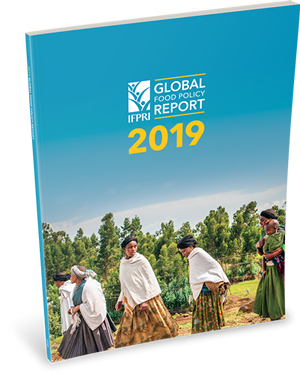Dhaka Press Release
Report Hashtags: #GFPR2019 #RuralRevitalization
2019 Global Food Policy Report
Crises in Rural Areas Threatens Progress in Hunger, Poverty Reduction; Urgent Need for Rural Revitalization, Strong Policies and Accountability
The report highlights Bangladesh as one of South Asia’s leaders in improving rural development indicators and food and nutrition security. At the same time, it also points to the need to close persistent rural-urban development gaps by continuing to design and implement innovative development programs that address rural needs. The event featured distinguished speakers from the government, policy think tanks, and academia who discussed Bangladesh’s track record of success and ways to carry it forward.
“Bangladesh’s sustained focus on rural development over several decades has made the country a global model for how to transform the lives of millions of poor rural men and women,” said Akhter Ahmed, Country Representative for IFPRI in Bangladesh. “The government has made important commitments to continue these improvements by investing in roads, electricity, healthcare, nutrition, and gender equality in rural areas.”
In Bangladesh, as in many developing countries, rural areas remain underserved and face a wide array of challenges, including severe environmental degradation, agrarian crises, and an acute shortage of jobs for a growing youth population. To overcome these challenges, the report calls for rural revitalization, highlighting policies, institutions, and investments that can transform rural areas into vibrant and healthy places to live, work, and raise families.
“Revitalizing rural areas can stimulate economic growth and begin to address the crises in developing countries, and also tackle challenges holding back achievement of the SDGs and climate goals by 2030,” said Shenggen Fan, Director General, IFPRI. “Rural revitalization is timely, achievable, and, most important, critical to ending hunger and malnutrition in just over a decade,” said Fan.
Most of the world’s poor live in rural areas: rural populations account for 45.3 percent of the world’s total population, but 70 percent of the world’s extreme poor. The global poverty rate in rural areas is currently 17 percent, more than double the urban poverty rate of 7 percent.
The report emphasizes that revitalization could make rural areas premiere hubs of innovations in just under a decade. It recommends revitalization through a focus on five building blocks: (1) creating farm and non-farm rural employment opportunities; (2) achieving gender equality; (3) addressing environmental challenges; (4) improving access to energy; and (5) investing in good governance.
The Minister of Agriculture Muhammad Abdur Razzaque laid out the national commitment to revitalizing rural areas during the event: “The Government of Bangladesh is working diligently to promote rural regions as viable habitats and economic areas where livelihoods are secured, economic growth is enhanced, and natural resources are used efficiently and sustainably.”
The report notes the great strides Bangladesh has made towards such a holistic revitalization of its rural areas, specifically highlighting the success of the country’s investments in rural infrastructure, social protection programs, and gender equality.
The report cites evidence that improving rural roads helped Bangladesh reduce extreme poverty by 3 to 6 percent and boost secondary school enrollment among both boys and girls. Programs that increased the availability of health workers and supported women’s political, social, and economic empowerment were also highlighted as key to the country’s success.
High-level decisionmakers in Dhaka emphasized the importance of women’s empowerment on the rural revitalization agenda. “The Ministry of Agriculture is committed to implementing rigorous evaluations and updating our policies to integrate evidence-based research that may increase women’s decision-making power, well-being, and access and rights to resources as a way to strengthen the linkages between agriculture and nutrition,” said Minister of Agriculture Razzaque.
Still, the report also underlined several areas in need of improvement. Bangladesh has low access to basic sanitation in rural areas, hovering just above 40 percent. Limited access to sanitation in rural Bangladesh may help explain why child stunting in the country, which experienced the fastest, most prolonged reduction in the world, has now plateaued to affecting slightly over one-third of children under-five, which remains too high. Progress in these and other areas of development remain critical to improve rural livelihoods.
The report also features chapters on how Europe’s experience can provide lessons for rural revitalization in developing countries; food policy trends from Africa, Asia, Latin America and other regions; updated data on food policy indicators and more. The report is the latest in an annual analysis of developments in food policy around the developing world, based on the most recent available evidence.
“With perseverance, 2019 can become the year when the will to eliminate hunger and malnutrition finally gathers momentum, forging a bright future for poor people around the world,” said Fan.
For the full report, synopsis, and more information on the report, click here: http://gfpr.ifpri.info/
To speak with chapter authors about the content and themes of the report, please contact Md. Shafiqul Karim: m.s.karim@cgiar.org
###
The International Food Policy Research Institute (IFPRI) seeks sustainable solutions for ending hunger and poverty. IFPRI was established in 1975 to identify and analyze alternative national and international strategies and policies for meeting the food needs of the developing world, with particular emphasis on low-income countries and on the poorer groups in those countries Visit: www.ifpri.org
Press Inquiries
Md. Shafiqul Karim
Email: m.s.karim@cgiar.org
Phone: +8801732822411
Social Media Toolkit
For general messaging about the report and recommended images
Fact Sheet
Facts and figures for reporting on rural vitalization

